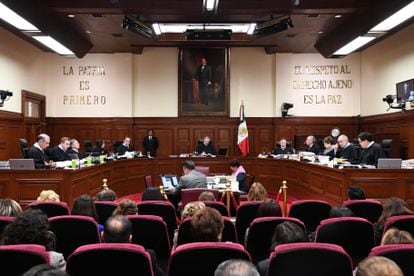The plenary session of the Supreme Court of Justice of the Nation, in a session of 2019 SCJN / SCJN
It has already become part of the usual agenda of current politics. It is rare the week that the challenge to the Supreme Court of any of Andrés Manuel López Obrador's reforms is not announced. The two and a half years of administration have resulted in frenzied activity in parliament, where Morena has a majority in both houses. The legislative roll of the government party has left little room for maneuver for the opposition, which, together with public institutions affected by the reforms, has increased the use of the judicial route. This same week two new calls were made to the Supreme Court. On Tuesday, the National Institute of Transparency (INAI) presented an action of unconstitutionality against the register of biometric data of mobile phone users. Before,The opposition had announced that it is already preparing another unconstitutionality action against the controversial extension of the mandate of President Arturo Zaldívar, at the center of the hurricane of criticism that points to the growing politicization of the highest Mexican court.
More information
López Obrador redoubles the pressure on the Judiciary: "Whoever arrives after Zaldívar will be more of the same"
Zaldívar, a judge caught in López Obrador's ideological war
Since the administration began, the challenges have now totaled more than a dozen, including the law that the National Guard has launched, the decree that protects the delivery of military tasks to the Army, the law that created the
superdelegates
, the reform electric or the Mayan Train.
None with a scheduled date even for discussion, fueling criticism for an alleged freezing of large cases for the benefit of the government's political times.
“There is a wide space of discretion within the Court to choose the priority of the agenda, which is in the hands of the president. It is a pending account that has to do with transparency and the regulation of criteria for resolution deadlines. But it is also true that it has always happened. Only now it has been exacerbated because there are many policies under the court's scrutiny ”, affirms the lawyer Jorge Peniche, specialist in litigating charges in the Court and co-director of the Transitional Justice organization in Mexico.
There are three ways to get a case to the highest court. Only one, the amparo trials, the appeal for the defense of fundamental rights, has a regulation of terms: three months from the notification to the parties that the appeal has been accepted. And they are seldom fulfilled, according to the consulate lawyers. The other two, the unconstitutionality action and the constitutional controversy, the most used avenues to challenge the laws and reforms of the Government, depend entirely on the criterion of the president of the plenary session or the chambers, and for the moment, they remain stuck. For the ITAM professor and expert on the intersection between politics and law, Julio Ríos “it is well known that during Zaldívar's mandate the large cases that are imputed to the Fourth Transformation have not been listed, they have not even been discussed.There seems to be an intention to delay these issues. "
The criticisms that point to a slowdown in the Court's agenda have intensified because there are cases that are already, let's say, in the outbox. In other words, the minister on duty has already analyzed the matter and presented the so-called draft resolution. The next step is your entry on the waiting list of the plenary session or in one of the two rooms to be debated and voted on. That is where the bottleneck appears, at the discretion of the presidents. Zaldívar, in plenary session and in the chambers, two of the three judges appointed by the Government of Morena: Ana Margarita Ríos Farjat and Yasmín Esquivel Mossa.
"The issue of superdelegates draws attention, which has not been resolved for more than two years and has a clear electoral nature," adds Peniche. In January 2019, the court admitted four appeals of unconstitutionality against the law that established this controversial and powerful political figure created by López Obrador to directly manage social programs in the different states of the country. The Court, in one of the last decisions before starting Zaldívar's presidency, admitted the complaints that highlighted his "wide margin of discretion to operate and create its own structure around programs that provide direct social benefits to the population." Two and a half years later and on the eve of the largest elections in Mexico, which will renew both chambers and 15 governorships,there are no clues as to when the resolution will come.
Subscribe here
to the
newsletter
of EL PAÍS México and receive all the informative keys of the current situation of this country

